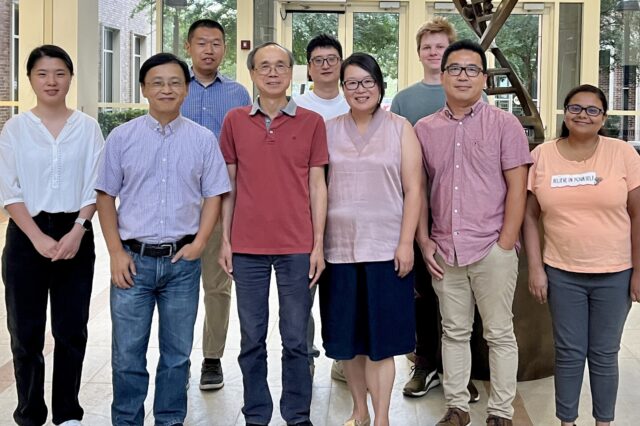UF researchers create powerful cancer-targeting compound

A team of University of Florida medicinal chemists and cancer biologists has created a chemical compound that powerfully and selectively helped cells dispose of proteins that cause cancer cells to grow.
In laboratory testing in breast cancer cells, the compound, known as YX968, demonstrated effectiveness in targeting unwanted proteins in cancer cells and recycling them from the cell — all without harming healthy gene expression.
“We found that YX968 was quite potent, meaning only a small amount was needed to achieve the desired effect of degrading proteins, and highly selective, meaning it was very specific in targeting two enzymes,” said Daiqing Liao, Ph.D., an associate professor in the department of anatomy and cell biology in the UF College of Medicine and co-senior author of the study, published Aug. 11 in Cell Chemical Biology, a peer-reviewed journal in the field of chemical biology. “Our findings indicate this compound could be a powerful cancer-fighting tool that doesn’t result in excess toxicity.”
YX968 is part of a group of compounds called proteolysis-targeting chimeras, or PROTACs, that have emerged as promising treatments for cancer because they not only selectively block the actions of cellular enzymes, they also trigger cells to get rid of proteins through the natural process of clearing waste products. About 20 PROTACs are being tested in clinical trials, with more in development.
“These compounds act like matchmakers, bringing together two proteins so one can destroy the other one,” said Yufeng Xiao, Ph.D., the study’s co-first author and an assistant scientist in the department of medicinal chemistry in the UF College of Pharmacy. He completed his postdoctoral training this year in the laboratory of Guangrong Zheng, Ph.D., co-senior author of the new study and a professor in the department of medicinal chemistry who was part of a UF team involved in developing the first PROTAC of its kind allowed to proceed to clinical trial by the U.S. Food and Drug Administration. “Because PROTACs are bifunctional, they can destroy the target, not just inhibit it.”
In the new study, the team wanted to find a compound that would rein in two histone deacetylases, or HDACs, which play a role in how cells modify proteins and express genetic information. The two HDACS, HDAC3 and HDAC8, have critical biological functions, but because of their chemical makeup, developing inhibitors that do not harm other targets has been challenging.
The researchers found that YX968 selectively degraded HDAC3 and HDAC8 without causing any detectable degradation of other HDACs. The researchers confirmed its selectivity through quantitative experiments.
“PROTACs can degrade their target in a fast and controlled way, making them more advantageous than traditional genetic editing methods,” said Liao, who is a member of the UF Health Cancer Center’s Mechanisms of Oncogenesis research program.
The researchers are refining the compound’s design to make it more druglike so it can be tested in animal models. The long-term goal is to develop a new therapeutic that is safe and effective. That will require a clinical trial in humans, which will take several years.
The new compound is also expected to help other laboratories study the biology of HDAC3 and HDAC8 to guide development of new therapies. Although the UF researchers focused on triple negative breast cancer — a more aggressive type of breast cancer — HDAC3 and HDAC8 play a role in other types of cancer too.
The study was supported by a pilot grant from the UF Health Cancer Center and a grant from the Florida Department of Health James and Esther King Biomedical Research Program.
About the author
